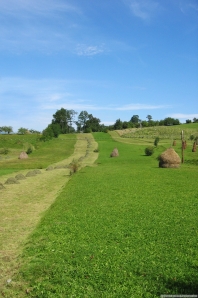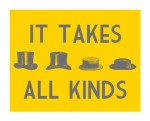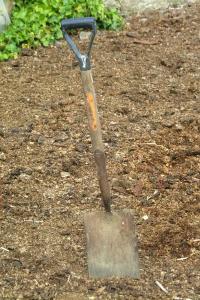NOTICING
Have you ever noticed that a lot of the time you are just not noticing? For instance, you are driving to the grocery store or to work (both of which you have done a million times), and not remembering when you arrive how you got there. Just traveling on auto pilot, or absorbed in a phone conversation, you have missed the ride. Perhaps you think, “I’ve done this trip so often I could do it in my sleep!” And guess what? In a very real way, you are! Conscious but not truly awake. 
Our daily tasks of necessary repetition and ritual, whether it brewing the coffee, throwing in another load of laundry, walking the dog, become so automatic that these activities become the things we do between the times we actually are doing something that we are fully engaged in and are aware of. The unfortunate thing is, if we add up all of these moments each day, we are actually “checked out” for a solid portion of our life.
You may recall the internet sensation a few years ago, where participants were asked to watch for how many times three white shirted basketball players came onto a scene. A shocking fifty percent missed seeing a person in a gorilla suit sauntering in, pumping his chest. Even when looking right at him! This phenomenon, coined “inattentional blindness” has been demonstrated time and again.
In Smithsonian (Sept. 2012), psychologist Christopher Chabris and journalist Mark Strauss set up an experiment where participants were told to jog behind a man and record how many times he touched his hat. As they jogged, they ran by a staged fight where two men were savagely beating a third man. In broad daylight, 45% missed the altercation entirely and at night, that number rose to 65%. 
We become so focused on what we think we need to see or so confident of what we know is there that nothing has the ability to enter.
While anthropologists posit that there is indeed an upside for why we have this ability to filter attention–specifically the benefit of being able to disregard distractions while trying to focus on a task, it appears we have become too proficient.
The limitations of inattentional blindness are felt everywhere. Complicating this issue is the overloading distraction dumping at all times. The myriad forms of instant communication continuously clamoring for our attention, leaving us breathless…and mind (less).
We feel the effects of our inattention in automobile accidents, addictions, rises in ADD/ADHD, and the rampant sense of isolation that occurs with the breakdown of intimacy and congeniality in all manners of relationships. The lack of simple presence of attention leads to misunderstanding and disconnection, and this includes our relationships with ourselves.
But there is a way out, and it starts today, in the here and now. The only time there is. We can begin in this moment to begin to purposely notice. We can purposely and voluntarily take mini breaks from our devices throughout the day.
We can pay attention to our breath and body as we enter our car on the way to the grocery store. We can take stock of our surroundings while driving. We may discover a beautiful old home along the road that we never knew was there, all these years on this same path. We could discover the cool breeze or warm sun on our face with our windows opened just a bit. Or we can simply marvel at how this car of ours gets us safely from one place to another .
In other words, there is nothing that is unworthy of our noticing. All parts of our days can be enriched by our very presence.
 Gary Snyder, in his work The Practice of the Wild points powerfully to this:
Gary Snyder, in his work The Practice of the Wild points powerfully to this:
”All of us are apprenticed to the same teacher that the religious institutions originally worked with: reality. Reality-insight says…master the twenty- four hours.
Do it well, without self-pity. It is as hard to get the children herded into the car pool and down the road to the bus as it is to chant sutras in the Buddha-hall on a cold morning.
One move is not better than the other, each can be quite boring, and they both have the virtuous quality of repetition.
Repetition and ritual and their good results come in many forms. Changing the filter, wiping noses, going to meetings, picking up around the house, washing dishes, checking the dipstick–don’t let yourself think these are distracting you from your more serious pursuits.
Such a round of chores is not a set of difficulties we hope to escape from so that we may do our “practice” which will put us on a “path”- it is our path”.



